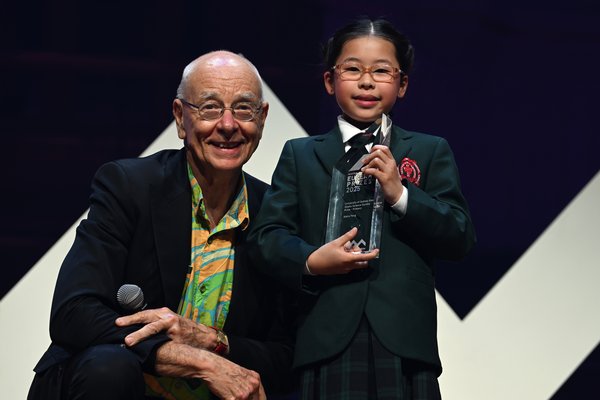Neuroplasticity: changing your brain
Who Iestyn R., St John's Anglican College, Forest Lake
What Brain scanning technology shows that the human brain can adapt throughout our lives. In his film Neuroplasticity - You Can Change Your Brain, Iestyn uses colourful graphics to explain how neurons connect via synapses. Through everyday examples, he shows that when connections become crowded with data, learning prompts an editing process that makes space for new information.
Winner of the 2022 University of Sydney Sleek Geeks Science Eureka Prize – Secondary

In his film Neuroplasticity - You Can Change Your Brain, Iestyn uses colourful graphics to explain how neurons connect via synapses.
Image: Supplied© Supplied
Your short film explores neuroplasticity. What sparked your interest in this topic?
I really enjoy watching shows about how the brain functions and find how people see the world interesting. To be honest, I like all shows related to science. Originally, I was introduced to this topic because of my year five teacher, she continually spoke about it to get us all to learn our times tables. When I say continually, I mean every day! I chose this for my short film to represent the theme ‘change’ as it was a topic everyone could relate to. Combining it with my love of how and why people behave the way they do made it the perfect topic.
You did a lot of research when producing your short film. What’s the most surprising thing that you learnt?
The most surprising thing I learnt was that we have more synapses (a synapse is a small gap at the end of a neuron that allows a signal to pass from one neuron to the next) when we are a toddler, than when we are a fully grown adult who has gone through 13 years of schooling. This surprised me as I believed that we would have more connections because of our experience. Imagine what we could accomplish if we could maintain those connections!
What was the most challenging thing about making your short film?
The most challenging thing about this film was culling the script to two minutes. It’s much tougher than you think. Normally I would have been excited about only needing to speak for two minutes but it’s really difficult. How do you shorten the film while keeping the key information and ensuring it makes sense? This will be the toughest part of any entry.
I enjoyed delving into how and why we learn what we learn, and why we retain some things and not others.
What did you enjoy most about the film-making process?
I enjoyed delving into how and why we learn what we learn, and why we retain some things and not others. Most of all I enjoyed creating the animations that featured in the film. My grandad bought me the software for Christmas, and it was the first time I‘d been able to use it to create something so important. I found it interesting and entertaining to see what I could create to add interest to the film.

Iestyn was awarded the 2022 University of Sydney Sleek Geeks Science Eureka Prize – Secondary for his short film Neuroplasticity - You Can Change Your Brain.
Image: Tim Levy© Australian Museum
We couldn’t help but notice the many books you had in the background when recording! What topics do you most like reading about?
I love reading about anything! Fantasy, sci-fi, science, maths, action-adventure, detective fiction and more. Some of my favourite book series are Percy Jackson and Harry Potter, and anything by Adam Spencer. Mum and Dad complain all the time about books laying around the house, I usually have about four on the go at once. I was so excited when I received a gift voucher from Abbey’s Bookshop as part of my prize. It was the first place we visited after the awards night. I purchased a book on string theory another on game theory as well as a Dr Karl book I didn’t already own, to add to my collection.
If you just dive in headfirst without thinking through your topic you may end up losing your way.
What’s your advice to other students thinking about entering the Sleek Geeks Science Eureka Prize?
My advice to future entrants is to go in with a plan and stick to it. If you just dive in headfirst without thinking through your topic you may end up losing your way. Decide what you are passionate about and follow through. Mum tried to influence me a bit on the topic, but in the end, I went back to where I started because it was something I felt passionate about. Good thing I didn’t listen to her! Just be you and let your passion shine through.
Sponsored by the University of Sydney, the Sleek Geeks Science Eureka Prize encourages students to communicate a scientific concept in a short film. It is intended to support budding young scientists across the nation, who will be our future leaders in research, discovery and communication.













